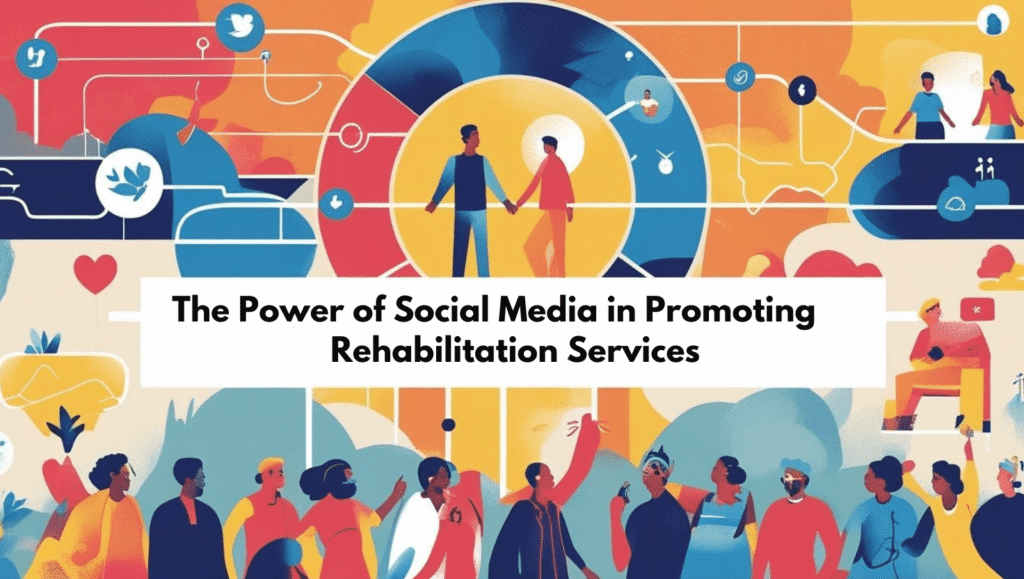Powerful Social Media Strategies for Rehabilitation Centers
Many rehabilitation centers struggle to connect with the people who need them most. Despite offering life-changing services, they often lack visibility online, especially on social media—where today’s patients and families turn for support, information, and trusted recommendations. Without a strong digital presence, your center may be missing critical opportunities to reach those in crisis or early recovery.
At Agha DigiTech, we understand the delicate balance required to market rehab services with empathy, credibility, and impact. Social media isn’t just about promotion—it’s a platform for education, awareness, and community. With the right strategy, your rehab center can build trust, combat stigma, and become a go-to resource for people seeking help.
Table of Contents
ToggleWhy Social Media Matters for Rehabilitation Centers.

Social media is essential for rehabilitation centers to connect with individuals seeking help, educate communities, and reduce stigma around addiction and mental health. It builds trust, showcases success stories, and offers real-time support. With the right strategy, social media becomes a powerful tool to raise awareness and guide people toward recovery when they need it most.
Educate: Social media allows rehab centers to educate the public about addiction, recovery, and mental health in an accessible way. By sharing facts, tips, and expert insights, you empower individuals to better understand their struggles and treatment options. Educational content builds credibility, dispels myths, and helps people make informed decisions about seeking help for themselves or loved ones.
Break the Stigma: Social media is a powerful tool for breaking the stigma surrounding addiction and mental health. By sharing real stories, compassionate messages, and supportive content, rehab centers can challenge misconceptions and humanize the recovery journey. This helps create a more understanding, open-minded community—encouraging more people to seek help without fear, shame, or judgment.
Build Trust: Trust is essential in healthcare—especially in addiction recovery. Through consistent, transparent social media content, rehab centers can showcase their team, facilities, values, and success stories. Sharing behind-the-scenes moments, staff introductions, and authentic testimonials helps potential patients and families feel more comfortable, confident, and connected before ever making that first call or inquiry.
Engage: Engagement on social media fosters meaningful connections with your audience. By responding to comments, sharing interactive content, and hosting live Q&As or polls, rehab centers create a supportive online community. This two-way communication not only builds loyalty and visibility but also shows that your center is approachable, compassionate, and genuinely invested in helping people recover.
Expand Reach: Social media enables rehabilitation centers to reach a broader audience beyond traditional marketing. Through strategic use of hashtags, shares, targeted ads, and collaborations, your message can connect with individuals actively seeking help—even if they haven’t visited your website. Expanding your reach increases awareness, drives inquiries, and ensures more people discover the support your center offers.
How to Manage Social Networks for Rehabilitation Centers
Effective social media management for rehab centers requires consistency, compassion, and compliance. Choose the right platforms, post helpful and hopeful content regularly, and engage respectfully with your audience. Protect patient privacy at all times, and ensure your messaging reflects empathy and professionalism. A strategic, well-managed presence builds trust and connects your center with those who need support.
Understand Your Audience and Platforms
To manage social media effectively, rehabilitation centers must first understand who they’re speaking to. Your audience may include individuals seeking recovery, concerned family members, healthcare professionals, and community advocates. Each group has different needs and responds to different types of content. Choose platforms based on where your audience spends time—Facebook and Instagram for storytelling and support, LinkedIn for professional outreach, and YouTube for educational videos. Tailor your tone, visuals, and messaging accordingly. Understanding your audience allows you to create content that resonates emotionally, drives engagement, and ultimately encourages those in need to take the first step toward recovery.
Build a Trustworthy and Compassionate Brand Voice
A trustworthy and compassionate brand voice is essential for rehabilitation centers on social media. Your messaging should convey empathy, understanding, and professionalism—speaking to individuals who may be vulnerable or in crisis. Use supportive, non-judgmental language that promotes hope and healing. Consistency in tone across all platforms builds familiarity and credibility. Highlight your team’s expertise while remaining warm and human. Avoid clinical jargon when addressing the general public, and instead focus on clear, reassuring communication. A compassionate voice helps people feel safe, understood, and more likely to reach out—making your center a trusted guide in their recovery journey.
Content Strategy: What to Post and Why
A strong content strategy helps rehab centers connect, educate, and inspire. Focus on a mix of content types: educational posts that explain addiction and recovery, inspirational stories and testimonials, staff spotlights to humanize your team, and FAQs to address common concerns. Visuals like infographics, videos, and carousels boost engagement and shareability. Highlight milestones, events, and behind-the-scenes glimpses to show authenticity and care. Always prioritize value—each post should either inform, support, or build trust. Consistency in posting keeps your center top-of-mind and positions you as a reliable source of help and hope in the behavioral health space.
Community Engagement Tactics
Community engagement is key to building strong, lasting relationships on social media. Respond promptly to comments and messages with empathy and helpfulness. Create interactive content like polls, Q&As, or mental health challenges to encourage participation. Share user-generated content—like recovery stories or thank-you messages (with consent)—to foster connection. Host live sessions with counselors or alumni to create a sense of accessibility and support. Use relevant hashtags to join larger health and recovery conversations. Regularly ask for feedback or input from your audience to make them feel seen and valued. Genuine engagement transforms followers into a loyal, supportive community.
Leveraging Paid Social Media Advertising
Paid social media advertising allows rehabilitation centers to precisely target individuals seeking help. Use geo-targeted ads to reach local communities, interest-based targeting to connect with those researching recovery, and retargeting to engage website visitors who didn’t convert. Lead generation ads can collect inquiries directly, making it easier to start conversations. Carefully craft ad copy that’s compassionate, clear, and compliant with healthcare advertising rules. Test different visuals, messages, and calls to action to optimize results. Paid campaigns boost visibility beyond organic reach, helping your center connect with more people at critical moments in their recovery journey.
Collaborations and Influencer Marketing in Healthcare
Collaborations and influencer marketing can amplify a rehabilitation center’s reach and credibility. Partner with local healthcare professionals, mental health advocates, or trusted community influencers who share your values and mission. These collaborations humanize your brand and make your message relatable to a wider audience. Ensure all partnerships maintain transparency and comply with healthcare regulations to protect patient privacy and trust. Co-create content such as interviews, testimonials, or educational posts that provide genuine value. When done thoughtfully, influencer marketing helps break stigma, raise awareness, and connect with people who might otherwise be unaware of your services.
Compliance and Ethical Considerations
Compliance and ethics are critical when managing social media for rehabilitation centers. Always adhere to HIPAA and other privacy laws by never sharing identifiable patient information without explicit consent. Ensure all content is truthful, transparent, and avoids misleading claims or guarantees about treatment outcomes. Train your social media team on ethical guidelines and regularly review content for compliance. Respect patient dignity by using sensitive language and avoiding stigma. Maintaining these standards protects your center’s reputation, builds trust with your audience, and safeguards the wellbeing of those seeking help, reinforcing your commitment to ethical, patient-centered care.
Why Choose Agha DigiTech for Your Rehab Center’s Social Media Strategy
Choosing the right digital marketing partner is crucial for rehabilitation centers aiming to make a meaningful impact online. At Agha DigiTech, we specialize in crafting tailored social media strategies that balance empathy, compliance, and effectiveness. We understand the sensitive nature of addiction and recovery, ensuring all content respects patient privacy and aligns with healthcare regulations like HIPAA.
Our experienced team combines healthcare knowledge with digital marketing expertise to develop compassionate, trustworthy brand voices that resonate with your audience. We don’t just create content—we build communities. By leveraging data-driven insights, we optimize campaigns for maximum reach and engagement, helping your center connect with individuals and families when they need it most.
From managing organic posts to running targeted paid advertising, Agha DigiTech offers comprehensive solutions designed specifically for rehab centers. We provide regular analytics and reporting, so you can see exactly how your social media efforts translate into real-world results. Our commitment is to support your mission of healing and hope by amplifying your message with integrity and care.
Conclusion
Social media is an essential tool for rehabilitation centers seeking to expand their reach, educate the public, and build supportive communities. When managed thoughtfully, it allows you to share hopeful stories, break down stigma, and connect with those who need help most. By understanding your audience, creating compassionate content, and engaging authentically, your center can become a trusted source of information and support.
At the same time, compliance with privacy laws and ethical standards ensures that your messaging respects the dignity and confidentiality of every individual. Partnering with experts like Agha DigiTech can streamline this process, combining digital marketing know-how with healthcare sensitivity. Embrace the power of social media to amplify your mission—helping more people find the care and hope they deserve.
FAQ
Q1: Is social media really necessary for rehab centers?
Yes. It’s a cost-effective, impactful way to raise awareness, reduce stigma, and reach those in need of support.
Q2: How often should rehab centers post on social media?
Aim for 3–5 times per week, depending on platform and resources. Consistency is more important than volume.
Q3: What’s the biggest mistake rehab centers make on social media?
Not prioritizing empathy or trying to “sell” too aggressively. The focus should always be on support and education.
Q4: Can I advertise rehab services on Facebook and Google?
Yes, but you must follow strict advertising policies. Partnering with an agency familiar with healthcare marketing is highly recommended.
Q5: How can I protect patient privacy on social media?
Never share any personal or health-related details without written consent. Use stock images, anonymized testimonials, or staged content when needed.




